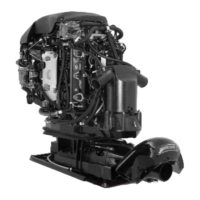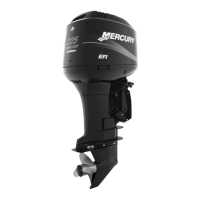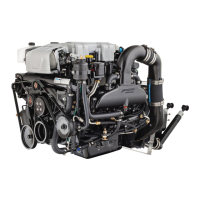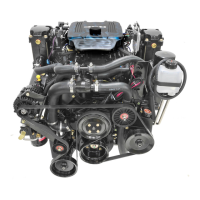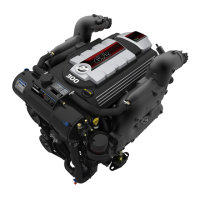!
WARNING
Fuel leakage is a fire or explosion hazard, which can cause serious injury or
death. Periodically inspect all fuel system components for leaks, softening,
hardening, swelling, or corrosion, particularly after storage. Any sign of
leakage or deterioration requires replacement before further engine
operation.
Because of the possible adverse effects of alcohol in gasoline, use only
alcohol‑free gasoline where possible. If only fuel containing alcohol is available,
or if the presence of alcohol is unknown, increased inspection frequency for
leaks and abnormalities is required.
IMPORTANT: When operating a Mercury Marine engine on gasoline containing
alcohol, storage of gasoline in the fuel tank for long periods should be avoided.
Long periods of storage, common to boats, create unique problems. In cars,
alcohol‑blend fuels normally are consumed before they can absorb enough
moisture to cause trouble, but boats often sit idle long enough for phase
separation to take place. In addition, internal corrosion may take place during
storage if alcohol has washed protective oil films from internal components.
Filling Remote Oil Tank
Remove the filler cap and fill the tank with the specified oil. The oil tank
capacity is 11.5 liters (3 US gallons). Replace the filler cap and tighten it
securely.
IMPORTANT: Always make sure the oil tank caps are threaded on tight. An air
leak will prevent oil flow to the engine.
Filling Engine‑Mounted Oil Reservoir Tank
NOTE: Filling this tank is only necessary if the oil level should ever drop and
the low oil warning system is activated.
1. Loosen the fill cap on the engine oil reservoir tank. Run the engine until all
the air has been vented out of the oil reservoir tank and the tank is filled
with oil to the point of overflow.
FUEL AND OIL
eng 31

